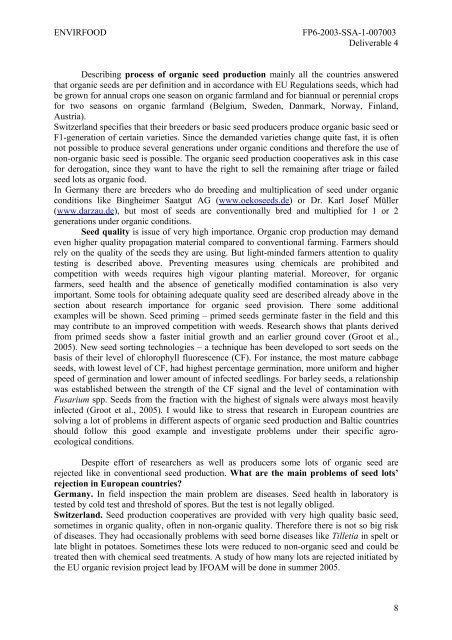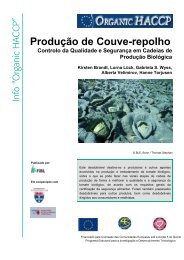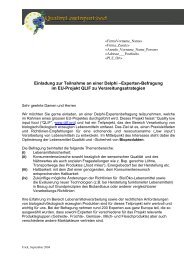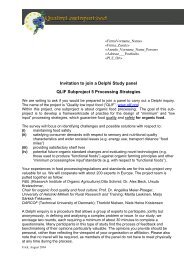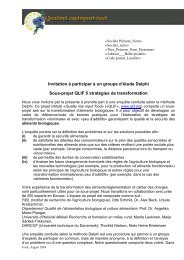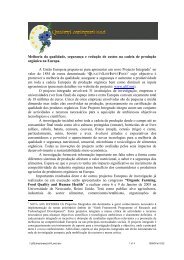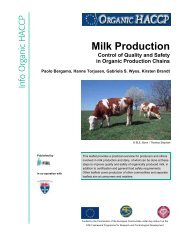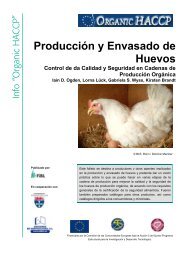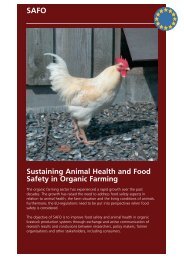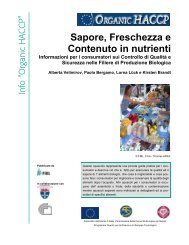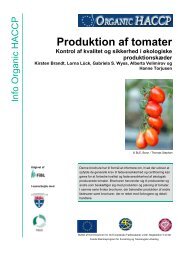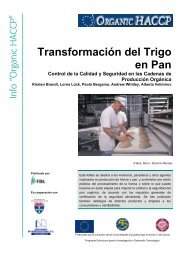ORGANIC SEED PROPAGATION: CURRENT STATUS AND ...
ORGANIC SEED PROPAGATION: CURRENT STATUS AND ...
ORGANIC SEED PROPAGATION: CURRENT STATUS AND ...
You also want an ePaper? Increase the reach of your titles
YUMPU automatically turns print PDFs into web optimized ePapers that Google loves.
ENVIRFOOD<br />
FP6-2003-SSA-1-007003<br />
Deliverable 4<br />
Describing process of organic seed production mainly all the countries answered<br />
that organic seeds are per definition and in accordance with EU Regulations seeds, which had<br />
be grown for annual crops one season on organic farmland and for biannual or perennial crops<br />
for two seasons on organic farmland (Belgium, Sweden, Danmark, Norway, Finland,<br />
Austria).<br />
Switzerland specifies that their breeders or basic seed producers produce organic basic seed or<br />
F1-generation of certain varieties. Since the demanded varieties change quite fast, it is often<br />
not possible to produce several generations under organic conditions and therefore the use of<br />
non-organic basic seed is possible. The organic seed production cooperatives ask in this case<br />
for derogation, since they want to have the right to sell the remaining after triage or failed<br />
seed lots as organic food.<br />
In Germany there are breeders who do breeding and multiplication of seed under organic<br />
conditions like Bingheimer Saatgut AG (www.oekoseeds.de) or Dr. Karl Josef Müller<br />
(www.darzau.de), but most of seeds are conventionally bred and multiplied for 1 or 2<br />
generations under organic conditions.<br />
Seed quality is issue of very high importance. Organic crop production may demand<br />
even higher quality propagation material compared to conventional farming. Farmers should<br />
rely on the quality of the seeds they are using. But light-minded farmers attention to quality<br />
testing is described above. Preventing measures using chemicals are prohibited and<br />
competition with weeds requires high vigour planting material. Moreover, for organic<br />
farmers, seed health and the absence of genetically modified contamination is also very<br />
important. Some tools for obtaining adequate quality seed are described already above in the<br />
section about research importance for organic seed provision. There some additional<br />
examples will be shown. Seed priming – primed seeds germinate faster in the field and this<br />
may contribute to an improved competition with weeds. Research shows that plants derived<br />
from primed seeds show a faster initial growth and an earlier ground cover (Groot et al.,<br />
2005). New seed sorting technologies – a technique has been developed to sort seeds on the<br />
basis of their level of chlorophyll fluorescence (CF). For instance, the most mature cabbage<br />
seeds, with lowest level of CF, had highest percentage germination, more uniform and higher<br />
speed of germination and lower amount of infected seedlings. For barley seeds, a relationship<br />
was established between the strength of the CF signal and the level of contamination with<br />
Fusarium spp. Seeds from the fraction with the highest of signals were always most heavily<br />
infected (Groot et al., 2005). I would like to stress that research in European countries are<br />
solving a lot of problems in different aspects of organic seed production and Baltic countries<br />
should follow this good example and investigate problems under their specific agroecological<br />
conditions.<br />
Despite effort of researchers as well as producers some lots of organic seed are<br />
rejected like in conventional seed production. What are the main problems of seed lots’<br />
rejection in European countries?<br />
Germany. In field inspection the main problem are diseases. Seed health in laboratory is<br />
tested by cold test and threshold of spores. But the test is not legally obliged.<br />
Switzerland. Seed production cooperatives are provided with very high quality basic seed,<br />
sometimes in organic quality, often in non-organic quality. Therefore there is not so big risk<br />
of diseases. They had occasionally problems with seed borne diseases like Tilletia in spelt or<br />
late blight in potatoes. Sometimes these lots were reduced to non-organic seed and could be<br />
treated then with chemical seed treatments. A study of how many lots are rejected initiated by<br />
the EU organic revision project lead by IFOAM will be done in summer 2005.<br />
8


